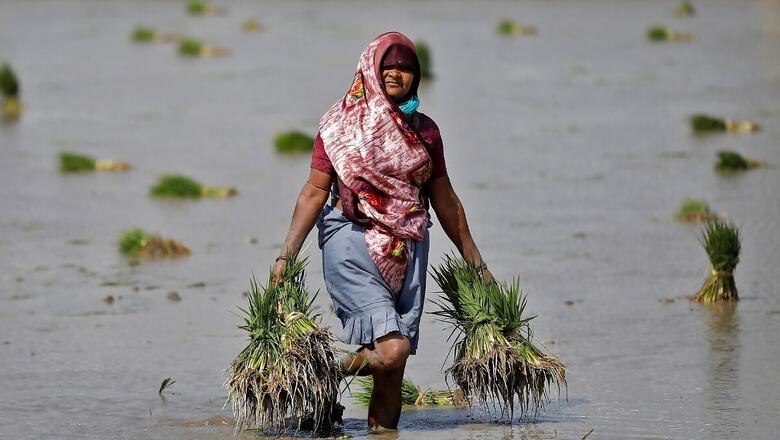
views
Climate change poses a huge global challenge. Unprecedented environmental degradation and pollution have caused a shift in weather patterns, affecting living beings as well as the economy and society. Its adverse effects are also manifested in agricultural production, which is threatening food security. Water paucity, soil degradation, and change in rainfall patterns lead to crop failure, and these are just some of the effects of climate change on food production.
Food security is a major concern for many countries, as steady food production and availability are essential to avoid malnutrition and death due to hunger. India, in particular, is facing difficulties in this regard. With billions of people residing in the country, a substantial population suffers from hunger and malnutrition. Challenges faced by farmers due to climate change have further exacerbated the food insecurity situation across India.
While agriculture is the backbone of the economy, many Indian farmers are impoverished and live below the poverty line. As per the 2015-16 agriculture census, marginal and small farmers represented 86 percent of the total farmers in India. They are vulnerable to extreme weather events and lack the resources to survive crop failures.
Some of the major challenges that farmers face are as follows:
- Water scarcity: One of the primary causes of crop failure that is linked to climate change is the scarcity of water. Rising temperatures and changing rainfall patterns lead to more frequent droughts, which can reduce crop yields and result in crop failure. In many regions, the water available for irrigation has decreased, making it more challenging for farmers to grow crops.
- Soil quality: Climate change is recognized as a significant contributor to soil degradation. Soaring temperatures and changes in precipitation patterns brought on by climate change have resulted in a decrease in soil moisture content, increase in soil erosion, and decline in soil fertility. This degradation is further compounded by a rise in extreme weather events such as droughts, floods, and storms, damaging the already vulnerable soil.
- Pests and diseases: A major consequence of climate change is the increasing prevalence of pests and diseases in agriculture. As temperatures rise and weather patterns change, pests and illnesses thrive in new areas, destroying crops and making it more difficult to grow food.
- Cropping patterns: Shifting weather patterns have a negative impact on crop yields, plants, and harvesting times, and the suitability of particular crops for specific regions. In a number of regions, prolonged droughts lead to crop failure, whereas in others, increased rainfall causes flooding and soil erosion. This has forced farmers to adapt by changing their cropping patterns, which can have significant economic implications.
Climate change-induced crop failure can severely impact food security in countries such as India, which relies heavily on agriculture for livelihood and sustenance. India is one of the world’s largest food producers, and the agricultural sector is critical to its economy.
Yet, as per the Intergovernmental Panel on Climate Change, the country is expected to see its rice production decrease 30 percent instead of the estimated 10 percent, if global warming over pre-industrial levels rises to 4°C from 1°C. In this scenario, maize production would also be affected and fall by 70 percent instead of 25 percent.
Hence, climate change can cause considerable crop losses, leading to food supply shortage and soaring prices. This can result in food insecurity, particularly for those struggling to get access to adequate nutrition. Additionally, crop failure can lead to an economic downturn in rural areas, where agriculture is the primary source of income.
In recent years, the global community has recognised the importance of addressing climate change and its impact on agriculture and food security. Governments and organisations have introduced initiatives to support farmers in adapting to the impact of climate change and developing more resilient farming systems. One such initiative is the Climate Smart Agriculture (CSA) launched by the World Bank. It aims to help farmers adapt to climate change while reducing greenhouse gas emissions and enhancing agricultural productivity.
The CSA approach emphasizes numerous practices that can assist farmers to adapt to the effects of climate change, such as:
- Diversifying crops: Farmers can grow a variety of crops that are more resilient to changing weather patterns as well as pests and diseases.
- Soil conservation: They can adopt practices that enable them to conserve soil fertility and prevent erosion, such as crop rotation, cover cropping, and reduced tillage.
- Efficient water usage: Drip irrigation and rainwater harvesting are some of the measures that farmers can employ to reduce water consumption and improve irrigation efficiency.
- Climate-resilient livestock management: Practices such as better breeding and feeding can help improve livestock health and productivity.
The Indian government has launched several initiatives to promote climate-resilient agriculture, such as the National Mission for Sustainable Agriculture and Pradhan Mantri Fasal Bima Yojana. These programmes focus on encouraging climate-smart agricultural practices, providing crop insurance, and developing better infrastructure for water management.
In addition, there are a number of other measures that can be taken to ensure food security. These include providing financial and technical support to farmers, investing in R&D of climate-resilient crops and livestock, and improving access to markets and credit for small-scale farmers.
One of the solutions is genetically modified crops, which could help farmers make the crop more resilient. However, these crops are known to harm the health and environment; therefore, instead of becoming a solution, they could exacerbate the problem.
India has realised the significance of addressing the issue of climate change and implementing sustainable agricultural practices to mitigate its impact on food security. However, much work remains to be done to safeguard food security in a future with an uncertain climate. Addressing climate change requires global cooperation and action, and governments and communities worldwide must work together to ensure food security and promote sustainable development.
The writer is Senior Manager, Growth Advisory, Aranca. Views expressed are personal.



















Comments
0 comment